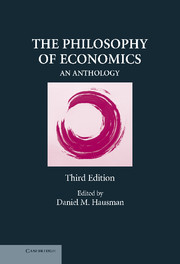Book contents
- Frontmatter
- Contents
- Introduction
- PART ONE CLASSIC DISCUSSIONS
- PART TWO POSITIVIST AND POPPERIAN VIEWS
- PART THREE IDEOLOGY AND NORMATIVE ECONOMICS
- 11 Science and Ideology
- 12 Welfare Propositions of Economics and Interpersonal Comparisons of Utility
- 13 The Philosophical Foundations of Mainstream Normative Economics
- 14 Why Is Cost-Benefit Analysis So Controversial?
- 15 Capability and Well-Being
- PART FOUR BRANCHES AND SCHOOLS OF ECONOMICS AND THEIR METHODOLOGICAL PROBLEMS
- PART FIVE NEW DIRECTIONS IN ECONOMIC METHODOLOGY
- Selected Bibliography of Books on Economic Methodology
- Index
- References
15 - Capability and Well-Being
Published online by Cambridge University Press: 05 June 2012
- Frontmatter
- Contents
- Introduction
- PART ONE CLASSIC DISCUSSIONS
- PART TWO POSITIVIST AND POPPERIAN VIEWS
- PART THREE IDEOLOGY AND NORMATIVE ECONOMICS
- 11 Science and Ideology
- 12 Welfare Propositions of Economics and Interpersonal Comparisons of Utility
- 13 The Philosophical Foundations of Mainstream Normative Economics
- 14 Why Is Cost-Benefit Analysis So Controversial?
- 15 Capability and Well-Being
- PART FOUR BRANCHES AND SCHOOLS OF ECONOMICS AND THEIR METHODOLOGICAL PROBLEMS
- PART FIVE NEW DIRECTIONS IN ECONOMIC METHODOLOGY
- Selected Bibliography of Books on Economic Methodology
- Index
- References
Summary
Amartya Sen (1933–) was born and educated in India before completing his doctorate in economics at Cambridge University. He has taught in India, England, and the United States and is currently the Lamont University Professor at Harvard University. He is one of the most widely read and influential living economists. His books have been translated into more than thirty languages. In 1998, he was awarded the Nobel Price in Economics for his work on welfare economics, poverty and famines, and human development. He has also made major contributions to contemporary political philosophy. In this essay, he proposes that alternatives be appraised by looking to the capabilities they provide for individuals rather than only by individual utilities, incomes, or resources (as in commonly used theories).
Introduction
Capability is not an awfully attractive word. It has a technocratic sound, and to some it might even suggest the image of nuclear war strategists rubbing their hands in pleasure over some contingent plan of heroic barbarity. The term is not much redeemed by the historical Capability Brown praising particular pieces of land – not human beings – on the solid real-estate ground that they ‘had capabilities’. Perhaps a nicer word could have been chosen when some years ago I tried to explore a particular approach to well-being and advantage in terms of a person's ability to do valuable acts or reach valuable states of being.
- Type
- Chapter
- Information
- The Philosophy of EconomicsAn Anthology, pp. 270 - 294Publisher: Cambridge University PressPrint publication year: 2007
References
- 25
- Cited by



